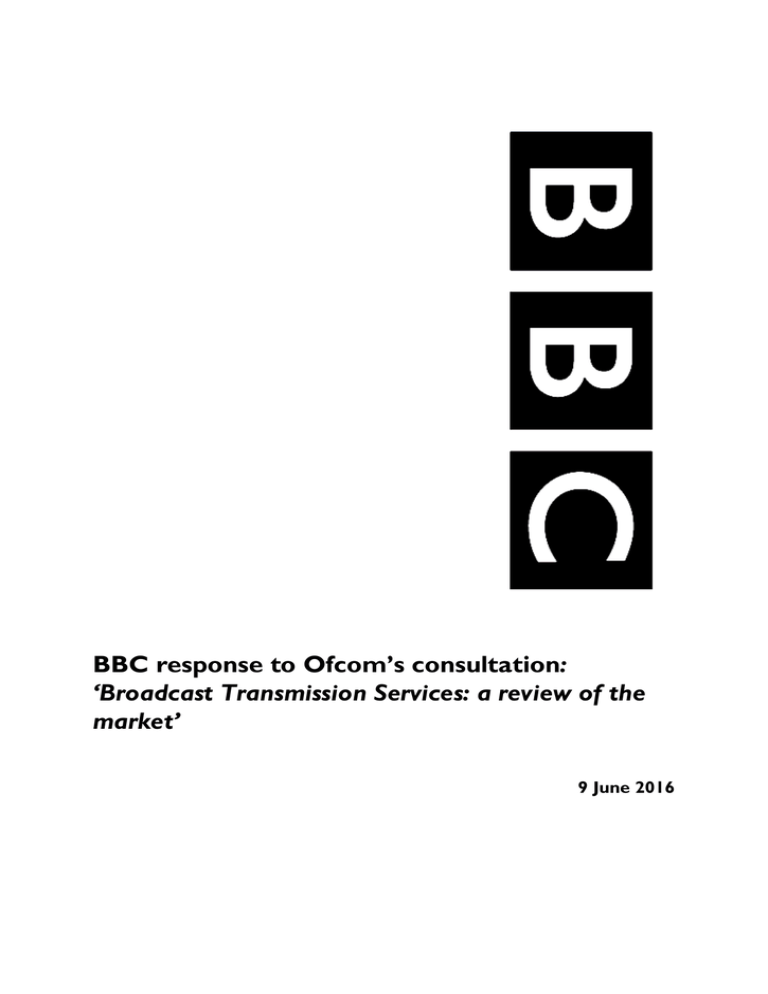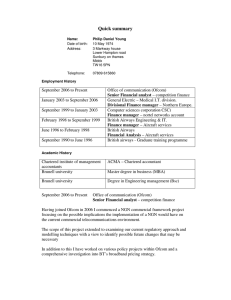BBC response to Ofcom`s consultation: `Broadcast Transmission
advertisement

BBC response to Ofcom’s consultation: ‘Broadcast Transmission Services: a review of the market’ 9 June 2016 The BBC’s response to Ofcom’s consultation: ‘Broadcast Transmission Services: a review of the market’ Overview 1. The BBC welcomes the opportunity to respond to Ofcom’s consultation ‘Broadcast Transmission Services: a review of the market’ 2. Arqiva is one of the BBC’s biggest suppliers by contract value. In FY 2015/16, the BBC paid Arqiva approximately , predominantly for terrestrial broadcast transmission services associated with our analogue radio, digital radio and digital television services. 3. The BBC buys Managed Transmission Services (MTS) from Arqiva, the great majority of the cost of which is for Network Access (NA). Ofcom’s proposal to remove significant market power regulation from Arqiva’s NA provision is therefore highly relevant to the BBC. 4. NA is a set of services which relies on access to suitable sites. There is a restricted number of such sites in the UK (e.g. hilltops suitable for broadcast transmission), giving rise to a local monopoly in any given area of mast, antennas, buildings and so on, that any prospective provider of MTS (whether Arqiva or otherwise) would have to use. Ownership of Network Access infrastructure by has up to now been recognised by Ofcom as giving Arqiva SMP, and is within the scope of Ofcom regulation. 5. The provision of MTS – the total managed package of circuit provision, transmitter infrastructure and NA that a broadcaster wishes to buy from a transmission provider – is in principle open to competition in the UK. When the merger of Arqiva and NGW was finalised in 2008, the Competition Commission cleared the merger subject to a set of behavioural measures (the Undertakings) to guard against the removal of the competitive pressure that the companies previously exerted on each other. The Undertakings are administered by the Office of the Adjudicator, BTS (“the Adjudicator”) with the intent of, among other things, preserving the potential for competition at the MTS level. In principle, Arqiva would make NA services available to its own MTS business on identical terms to those of a third party provider, who could then compete for the business. The Adjudicator has powers to ensure the operational separation of Arqiva’s NA and MTS businesses and we understand that he exercises these. 6. Ofcom’s consultation ‘Broadcasting Transmission Services: a review of the market’ raises several concerns, but in short, we do not agree with Ofcom’s conclusion that the SMP regulatory conditions imposed on Arqiva in 2005 should be removed. 7. Ofcom’s assessment that no operator holds SMP in the NA market relies on the strength of the Arqiva/NGW Undertakings. There have been few opportunities to test the Undertakings and the market conditions they seek to encourage, and there is little evidence that they genuinely preserve the potential for competition. 8. Indeed, Arqiva enjoys 100% share of the DTT NA market and an estimated 90% share of the radio NA market (paragraph 5.7).1 The BBC, like all of Arqiva’s NA customers, relies on the SMP regulations to restrain Arqiva’s market power. The BBC is concerned that there is no effective constraint within the Undertakings to ensure that Arqiva manages its costs effectively and this poses a material risk to Arqiva’s customers in a captive market. Importantly, the BBC 1 http://stakeholders.ofcom.org.uk/binaries/consultations/broadcasting-transmission-services/summary/BTS.pdf 2 The BBC’s response to Ofcom’s consultation: ‘Broadcast Transmission Services: a review of the market’ also considers that the Undertakings do not provide any incentive for Arqiva to drive costs down as would normally occur in a properly functioning market which is exposed to competition. 9. Given the scale of the BBC’s financial obligations in relation to Broadcast Transmission Services and our serious concerns regarding any foreseeable removal of SMP regulations in this area, the BBC would welcome the opportunity for a timely discussion of this response with Ofcom. 10. We have set out answers to Ofcom’s questions below. 3 The BBC’s response to Ofcom’s consultation: ‘Broadcast Transmission Services: a review of the market’ Answers to questions in Ofcom’s call for input Question 1: Do you agree with our assessment of the relevant markets? If not please set out the basis for your disagreement. 11. The BBC agrees with Ofcom’s assessment of relevant markets in so far as they relate to NA for masts and sites. Question 2: Do you agree with our assessment that the DTT and radio NA markets are suitable for ex ante regulation on the basis of our assessment of the three criteria test? If not, please set out the basis for your disagreement. 12. The BBC agrees that the DTT and radio NA markets are suitable for ex ante regulation on the basis of the three criteria test. The BBC considers there are high barriers to entry in both markets and little sign of new entrants. For example, when the BBC tendered for provision of most of its analogue and digital radio services in 2013, it was on the basis of competed MTS provision against a reference offer (RO) for NA provided by Arqiva. Several issues emerged during this process, for example: The Undertakings require that an RO is provided only 6 months before contract expiry, which is impractically short for a public procurement process, and a disadvantage for any non-incumbent bidder Essential commercial aspects of the MTS service – for example, indexation and service level agreement (e.g. availability and response times) are determined for the NA element in the RO and it is unclear how the MTS provider can negotiate these to provide a better deal to the customer Some elements of necessary service infrastructure did not fall clearly within the scope of either NA or MTS provisions in the Undertakings, and were therefore not subject to the same constraints 13. Matters such as these were the subject of intense discussion with Arqiva and other prospective providers for MTS services at the time. 14. Question 3: Do you agree with our proposal that no operator holds SMP in the DTT NA market or the radio NA market, as a result of the Arqiva/NGW Undertakings? If not, please explain why. 15. The BBC does not agree with Ofcom’s proposal that no operator holds SMP in either the DTT NA market or the radio NA market as a result of the Arqiva/NGW Undertakings. Insufficient evidence to demonstrate robust undertakings 16. Ofcom does not present evidence to demonstrate why the Undertakings prevent Arqiva holding SMP. The main evidence presented by Ofcom is the 2015 CMA report ‘Understanding past merger remedies: Report on case study research’ (‘the CMA report’). We believe the case contained 4 The BBC’s response to Ofcom’s consultation: ‘Broadcast Transmission Services: a review of the market’ in this report is not of sufficient strength to support Ofcom’s claim that “the Undertakings effectively remove Arqiva’s ability to act, to an appreciable extent, independently of competitors, customers and consumers and that it therefore does not have SMP in either the DTT NA or radio NA market”2. In particular the evidence used to consider the case of Arqiva was gathered in 20123 when the remedies placed on Arqiva had not yet been stress tested (as expressly noted in the 2012 report). Any interview or evidence gathered by the CMA from the BBC for its review is therefore highly likely to have been before the BBC went through the process of tendering and awarding the New Radio Agreement. This procurement was in our view the first time that the undertakings would have been tested. On this basis we believe the views expressed in the historic CMA report are insufficiently robust to support the conclusions drawn by Ofcom that the Undertakings are such that Arqiva does not hold SMP in circumstances where Ofcom’s very own findings in Section 4 of the Consultation are that competition law remedies are insufficient to remedy any market failure. It is also unclear why the existence of behavioural undertakings is considered to prevent the existence of a position of SMP. Given Ofcom's role as the relevant competent authority, Ofcom should not simply rely on a historic report without satisfying itself that the report reflects current market views. This is particularly so when Ofcom’s own findings are that buyer power does not provide an adequate constraint and this is a further issue which does not reconcile with Ofcom’s conclusions in section 5 regarding the merit of the Undertakings. Ofcom found that these markets are not subject to effective competition 17. We agree with Ofcom’s conclusion in Section 4 that the markets in question are not subject to effective competition. Therefore we consider Ofcom is obliged to conclude that Arqiva holds a position of SMP. This is based on Article 16(4) of the Framework Directive 2002 which states that once a market is found not to be the subject of effective competition, the NRA shall identify undertakings with SMP and shall impose regulatory obligations. Para 114 of the Commission’s 2002 Guidelines also makes clear that once the three cumulative criteria are satisfied, an NRA does not have any discretion as regards the finding of SMP; the NRA “must designate (...) and impose (...)". Section 79 CA 2003 requires that Ofcom must take due account of all applicable guidelines and recommendations relating to what constitutes SMP which would include the Commission’s 2002 Guidelines. Other relevant factors 18. We also believe that in undertaking the analysis, Ofcom should have considered that according to para 75 of the Commission’s 2002 Guidelines an undertaking with a large market share which has been stable over time is presumed to be dominant. This is a relevant factor in considering whether Arqiva holds a position of SMP and we believe should have been considered in addition to other factors set out in Ofcom’s market power assessment in Section 5.4 2 Paragraph 5.16 cf page 383 of the CMA report 4 Ofcom considered the following criteria as relevant (i) the structure of the market and barriers to entry; (ii) countervailing buying power; (iii) must carry obligations and (iv) impact of the CMA Undertakings. 3 5 The BBC’s response to Ofcom’s consultation: ‘Broadcast Transmission Services: a review of the market’ 19. We consider that Ofcom has not adequately explained why the existence of the Undertakings is sufficient to override Ofcom's own conclusions that the 2014 Recommendation’s three cumulative criteria test is met. On this basis and for the reasons set out above we do not believe it is appropriate for Ofcom to remove the SMP conditions as proposed. Implications if SMP conditions are removed 20. We agree with Ofcom that with some exceptions (e.g. cash discounts for existing payments which were provided in the CMA Undertakings at the time of the merger) the Undertakings and SMP Conditions pursue broadly the same aims. However, we do not think they are comparable. This is because the two regimes differ in that Ofcom enforces the SMP conditions whereas the CMA Undertakings rely on the Office of the Adjudicator. In this respect there are important and material differences between the operation of Ofcom and the OTA-BTS which are relevant to this decision. We would be happy to discuss these matters further with Ofcom. A substitute for competition? 21. An area of particular concern is around the incentive to drive value for money in the market for NA. Competition would drive value for money in the market and keeps costs down for customers. . The Undertakings require that pricing should be cost-oriented and that cost should be reasonably and efficiently incurred at the time of agreeing new contracts. However, we do not believe that the current regime actively exerts downward pressure on the costs on which pricing is based to ensure they are incurred as efficiently as possible. Rather, there is significant reliance on the customer to assess the basis for and dispute charges if they so choose . 22. 23. The OTA does have the power, which it has exercised, to carry out audits of Arqiva in respect of its processes in performing its business. However, such system and process audits serve primarily to demonstrate that Arqiva is following appropriate procedures and operating on a cost-oriented pricing basis. They do not in our view ensure that Arqiva is exerting downward pressure on its cost base in order to deliver best value for money to its customers, as would happen naturally in a competitive market. 24. The BBC is therefore concerned that there is no effective constraint within the Undertakings to ensure that Arqiva manages its costs effectively. . Importantly, the BBC also considers that the Undertakings do not provide any incentive for Arqiva to drive costs down as would normally occur in a properly functioning market which is exposed to competition. . Transparency 25. There is a perception that within the OTA-BTS there is a tension between: a. representing the interests of Arqiva’s customers in respect of value for money in network access; and b. ensuring a healthy broadcast transmission market. 6 The BBC’s response to Ofcom’s consultation: ‘Broadcast Transmission Services: a review of the market’ It is not always clear to Arqiva’s customers how these concerns are balanced. 26. Indeed, our understanding of the role of the Office of the Adjudicator is that it does not have an active role in representing the interests of customers, but rather a post-hoc responsibility to investigate and adjudicate should the customers feel that Arqiva has not acted in line with the Undertakings. 27. For example, the OTA’s website indicates that, other than consultations regarding its own budget, the OTA has consulted on only one matter since 2009.5 . 28. 29. We contrast this [example] with the transparent nature of Ofcom’s work, where the degree of rigour which is brought to dealing with complaints and concerns can be easily observed. Process of appeal 30. The transparency problem is compounded as there is no route of appeal for decisions made by the Adjudicator. This is an inherent weakness in the current regime. In contrast, as Ofcom is aware, a decision relating to SMP conditions (including withdrawal of SMP conditions) can be appealed to the Competition Appeal Tribunal (CAT) via section 192 of the Communication Act on points of fact and law (with the option to appeal the CAT judgment on grounds of law to the Court of Appeal). 31. This points to inadequacies in the CMA undertakings and we therefore believe that the Ofcom SMP conditions should remain in place. ENDS. 5 http://www.adjudicator-bts.org.uk/consult.htm 7

